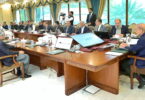F.P. Report
PESHAWAR: The PPP-Parliamentarians President, Asif Ali Zardari on Thursday said that the party would continue to support the Federally Administered Tribal Areas (Fata) reforms even if Fazlur Rehman’s Jamiat Ulema-i-Islam-Fazl (JUI-F) does not change its stance.
The JUI-F chief has vehemently opposed the Fata reforms package. Addressing a press conference in Peshawar, Zardari recalled that former prime minister Benazir Bhutto had approached the Supreme Court and asked for Fata to be brought under its jurisdiction.
Zardari added that during their rule, the PPP had drafted 63 laws which were applicable in Fata and much debate was held on the subject of merging the tribal areas.
However, he said that the timing was not suitable then as the war against terrorism was at its peak.
“In Swat, it was not Pakistan’s flag that was being waved; rather a different flag altogether,” he said. “We fought the war, we handled the internally-displaced persons and wiped Waziristan clean of extremists.” “At the time, the conditions were not as they are today. Today is the time to merge Fata.”
Zardari said that if the People’s Party forms a government in the 2018 general elections, the party will merge Fata with KP. “We will declare it a province, and once its writ is established, we will develop roads and the insurgency in the area will be finished,” the former president said.
“Right now, that area is inaccessible. We will create a special war package for KP and, with the assistance of the world and the provincial and federal governments. We will satisfy the people of Fata,” he said, promising to bring rehabilitation and development to the area for the youth through economic development.
Zardari listed the achievements of his government and said that the PPP had served Sindh better than the PML-N has served the country during its rule.
Zardari said that all parties need to collaborate to find a solution to the threats that democracy is facing in the country, adding that the crux of the responsibility to do so falls on the ruling government.






